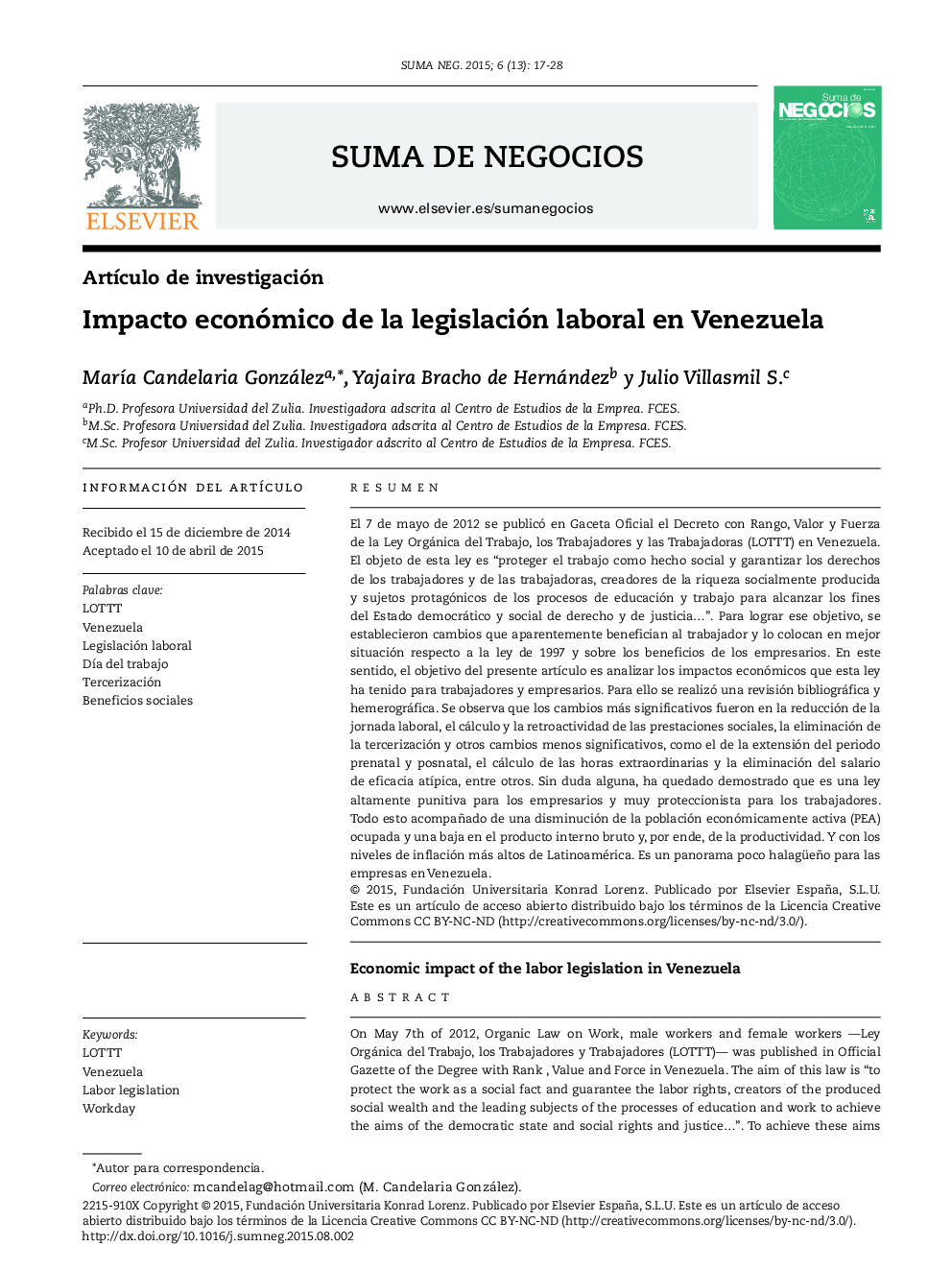| کد مقاله | کد نشریه | سال انتشار | مقاله انگلیسی | نسخه تمام متن |
|---|---|---|---|---|
| 1025279 | 941896 | 2015 | 12 صفحه PDF | دانلود رایگان |
ResumenEl 7 de mayo de 2012 se publicó en Gaceta Oficial el Decreto con Rango, Valor y Fuerza de la Ley Orgánica del Trabajo, los Trabajadores y las Trabajadoras (LOTTT) en Venezuela. El objeto de esta ley es “proteger el trabajo como hecho social y garantizar los derechos de los trabajadores y de las trabajadoras, creadores de la riqueza socialmente producida y sujetos protagónicos de los procesos de educación y trabajo para alcanzar los fines del Estado democrático y social de derecho y de justicia…”. Para lograr ese objetivo, se establecieron cambios que aparentemente benefician al trabajador y lo colocan en mejor situación respecto a la ley de 1997 y sobre los beneficios de los empresarios. En este sentido, el objetivo del presente artículo es analizar los impactos económicos que esta ley ha tenido para trabajadores y empresarios. Para ello se realizó una revisión bibliográfica y hemerográfica. Se observa que los cambios más significativos fueron en la reducción de la jornada laboral, el cálculo y la retroactividad de las prestaciones sociales, la eliminación de la tercerización y otros cambios menos significativos, como el de la extensión del periodo prenatal y posnatal, el cálculo de las horas extraordinarias y la eliminación del salario de eficacia atípica, entre otros. Sin duda alguna, ha quedado demostrado que es una ley altamente punitiva para los empresarios y muy proteccionista para los trabajadores. Todo esto acompañado de una disminución de la población económicamente activa (PEA) ocupada y una baja en el producto interno bruto y, por ende, de la productividad. Y con los niveles de inflación más altos de Latinoamérica. Es un panorama poco halagüeño para las empresas en Venezuela.
On May 7th of 2012, Organic Law on Work, male workers and female workers —Ley Orgánica del Trabajo, los Trabajadores y Trabajadores (LOTTT)— was published in Official Gazette of the Degree with Rank, Value and Force in Venezuela. The aim of this law is “to protect the work as a social fact and guarantee the labor rights, creators of the produced social wealth and the leading subjects of the processes of education and work to achieve the aims of the democratic state and social rights and justice…”. To achieve these aims changes were established that apparently benefit the employees and place them in a better situation, in respect to the 1997 law, and on the benefits of the entrepreneur. In this sense, the aim of the present article is to analyze the economic impacts that this law has had on both the employee and the entrepreneur, using a review of the literature and journals. It was observed that the most significant changes were in the reduction of the workday, the calculation and the retroactivity of the social benefits, the elimination of outsourcing, and other less significant changes such as, pre and postnatal period extension, the calculation of the overtime, the elimination of the outstanding performance bonus, among others. It was shown, without any doubt, that this law is highly punitive for the entrepreneurs and very protective for the employees. All these came along with a decrease in the Economically Active Population (PEA), with a decrease in the gross domestic product and, thus, productivity. And now with the highest levels of inflation in Latin America, this is an unflattering landscape for companies in Venezuela.
Journal: Suma de Negocios - Volume 6, Issue 13, January–June 2015, Pages 17–28
